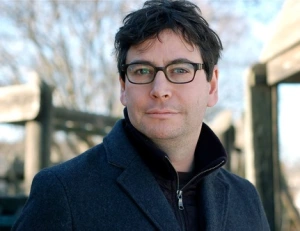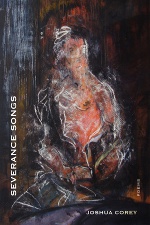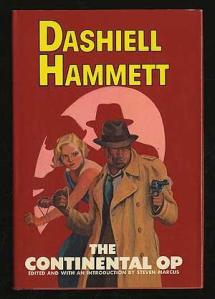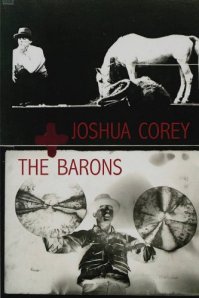
Five years ago Evanston poet Joshua Corey began to experience an unusual sensation. After publishing three celebrated poetry collections, the Lake Forest College professor suddenly felt the “uncharacteristic itch to write some prose.” Readers everywhere should be thankful he scratched that itch because the result was Corey’s fantastic first novel Beautiful Soul: An American Elegy. Described as “an impressive postmodern noir debut,” Beautiful Soul “centers around Ruth, a bored and frustrated young mother in the Chicago suburbs haunted by the letters she receives from her own mother, who has been dead for several years.” On Thursday, October 2nd, you can hear Mr. Corey read from Beautiful Soul when he visits EPL’s 1st Floor Community Meeting Room at 7 p.m. along with local authors Patrick Creevy and Dennis Byrne. In anticipation of his visit, we recently spoke with him via email about the evolution of Beautiful Soul, poetry vs. prose, mother-daughter relationships, hardboiled detective novels, and his latest John Ashbery-approved poetry collection.
Evanston Public Library: Beautiful Soul is a terrifically inventive experimental novel that has been favorably compared to the work of Italo Calvino, Claude Simon, W.G. Sebald, and Cynthia Ozick. How do you react to comparisons to such a celebrated group of authors? Do you see Beautiful Soul as fitting into any particular genres or literary movements?
 Joshua Corey: I’m terrifically flattered, of course. One thing that particular configuration makes me think of in my own work is the sometimes vertiginous interaction of the moral imagination with a more playful and anarchic spirit. Calvino, for example, in novels like If on a Winter’s Night a Traveler demonstrates an absolute and enviable lightness of touch, whereas the experimentalism of the other writers is bound up with their powers of judgment, specifically their encounter with the moral disaster of the twentieth century’s wars. I often feel torn between the desire simply to play with and in language, and the call to respond to the world. The aesthetic proposition and the moral judgment interact in unpredictable ways in my writing. As far as genres or movements, I do feel that Beautiful Soul draws upon a tradition of the European art novel, even as I insist upon its Americanness, right there in the subtitle—it’s an updating, maybe, of Henry James’s “international” theme. Virginia Woolf and José Saramago were major influences too.
Joshua Corey: I’m terrifically flattered, of course. One thing that particular configuration makes me think of in my own work is the sometimes vertiginous interaction of the moral imagination with a more playful and anarchic spirit. Calvino, for example, in novels like If on a Winter’s Night a Traveler demonstrates an absolute and enviable lightness of touch, whereas the experimentalism of the other writers is bound up with their powers of judgment, specifically their encounter with the moral disaster of the twentieth century’s wars. I often feel torn between the desire simply to play with and in language, and the call to respond to the world. The aesthetic proposition and the moral judgment interact in unpredictable ways in my writing. As far as genres or movements, I do feel that Beautiful Soul draws upon a tradition of the European art novel, even as I insist upon its Americanness, right there in the subtitle—it’s an updating, maybe, of Henry James’s “international” theme. Virginia Woolf and José Saramago were major influences too.
EPL: Could you give us some insight into your inspiration for Beautiful Soul? Where did the idea for the book originate, and how did it evolve over time?
JC: In the spring of 2009 I felt the somewhat uncharacteristic itch to write some prose. I didn’t know what it was about or what shape it was going to take, but one of the first things I wrote was that opening section, in which my heroine Ruth, aka “the new reader” is trying to “read” her own environment (her bedroom at night) and her own life, in which the undisclosed historical traumas of her mother (the daughter of Holocaust survivors) are resonating. That’s a form of autobiography: my own mother’s parents both survived Auschwitz, and she was haunted by that her whole life, and by her own experiences as a very young child, first hiding in Budapest during the war, then later in a displaced persons camp before they came to the United States. I was also thinking about the experience of the 1960s, which was the experience of my parents’ generation (although they were just a little too old to fully participate in the Summer of Love, et al), and wanting to understand why it had such lingering power over our cultural imagination. There’s that great Radiohead song “The Bends” where Thom Yorke sings “I wish it was the sixties, I wish we could be happy, / I wish, I wish, I wish that something would happen!” Well, what DID happen exactly, and what happened to that happiness? So I placed the novel’s mother figure in Paris in May ’68, which was a more ecstatic moment than the analogous one in this country (the Democratic Convention in Chicago) though as far as I know she wasn’t in either place. It was probably my first sustained experience thinking fictively—that is, using characters and situations to think about something that I otherwise might have dealt with discursively in an essay or a poem. I enjoyed it!
 EPL: In his review of the novel, R. Alan Clanton praises the way your “gifts as a poet can be experienced on nearly every page of this 369 page long poem.” Can you discuss the ways in which your poetry influenced Beautiful Soul? How does the process of writing fiction differ from writing poetry? Was it a difficult transition?
EPL: In his review of the novel, R. Alan Clanton praises the way your “gifts as a poet can be experienced on nearly every page of this 369 page long poem.” Can you discuss the ways in which your poetry influenced Beautiful Soul? How does the process of writing fiction differ from writing poetry? Was it a difficult transition?
JC: One thing I love about poetry is how open it is to whatever’s happening, in my life or on the news or to the words I just put on the page, which by association produce new words or slipstream into alternative meanings. Fiction, at least realist fiction, wasn’t much fun for me to write in the past because it felt too much like painting by numbers, filling in predefined spaces; I didn’t like feeling that what I was going to write today was determined by whatever I’d written yesterday. So I could only write a novel by giving myself permission, every day, to begin with a blank page—that’s why the first half of the book has a more fragmentary feel than the second half. By the time I got to the second half I had created a new narrator, Gustave (a French art student with a hopeless crush on Ruth’s mom), and found his voice so mesmerizing that I was able to sustain a more straightforward narrative for many pages. Maybe that’s the secret of fiction-writing: fall in love with a voice. For better or worse, as a writer I’m committed to the beauty and energy of language (lines in the case of poetry, sentences and paragraphs in the case of prose); it came as something of a surprise to me to see a plot and characters emerge. But emerge they did!
EPL: The novel centers on Ruth’s complicated relationship with her mother as well as her own difficult transition into motherhood. Can you discuss the mother-daughter relationships in the book? To what degree are we all “haunted” by our parents, and is it ever possible to truly know them? Do you think Americans and Europeans relate differently to their family history?
JC: Wow that’s a complex question. I guess from what I’ve seen that the mother-daughter relation is a peculiarly fraught one, and perhaps strangely as a man I identify with it. I think of Oscar Wilde’s epigram: “All women become like their mothers. That is their tragedy. No man does, and that is his.” I feel the force of both halves of that. Ruth, I think, is struggling not to become her mother, who she sees as having been half-hearted as a mother; the irony of this of course is this selfsame struggle distracts Ruth from mothering. She’s also struggling with a post-feminist moment in which women seem to feel enormous pressure to identify as mothers, not simply to “do” motherly things. (Most of the fathers I know don’t feel any comparable pressure, and though I have a daughter I don’t much identify with the traditional cultural role of father, which orients around authority rather than nurturing.) I do think we are haunted by our parents: while they’re alive this takes the form of being haunted by ourselves, because it’s so tempting to revert to childhood in the parent’s presence. When you lose a parent, as I lost my mother, then in a strange way it’s more possible to maintain an adult relationship: so often I wonder what she would think or say about my life or something that I’ve written. As far as Europeans versus Americans I couldn’t say, but I do have a sense of Europeans living in history generally, whereas Americans are fearfully committed to “presentism” and self-reliance.
 EPL: What appeals to you about the hardboiled detective novel? In what ways did your postmodern take on the genre best serve your story?
EPL: What appeals to you about the hardboiled detective novel? In what ways did your postmodern take on the genre best serve your story?
JC: T.S. Eliot was fond of murder mysteries of the cozy English drawing-room sort, and so was my mother—I remember stacks of books by Agatha Christie and John Dickson Carr in our house growing up. But I prefer the American hardboiled tradition of Hammett and Chandler, in which it’s the quality of the scenes and the intensity of the language that drives the narrative along, and plots are secondary (and often full of holes you could drive a truck through). I like how the detective novel preserves a version of the Romantic quest in a modern, urban context: Philip Marlowe is like Redcrosse in The Faerie Queene, whose adventures turn him into their adequate hero by the end. The noir tradition inverts Redcrosse’s journey toward purity, of course; in noir, the hero discovers that he is implicated in the crime he’s trying to solve—that one goes all the way back to Oedipus. My detective character, Lamb, is Ruth’s fantasy of action—a way to cut through her own sterile panic so as to create a usable past for her mother and therefore for herself. Or at least that’s how I see it.
EPL: Beautiful Soul is filled with overt references to film and the art of moviemaking, and as R. Alan Clanton observes, “[m]any passages read pleasingly like a film treatment.” Do you have a background in cinematography? Can you discuss the role film plays in the novel as well as the movies that most influence your work?
JC: I took a six-week filmmaking course at NYU when I was in college one summer, and I had a semester’s internship at an indie production company, Good Machine, which went on to do some remarkable things (one of their directors was Ang Lee), and I seriously considered trying to become a filmmaker. But mostly when it comes to film I’m an amateur. In some ways the novel’s cinematic elements pay homage to the atmosphere and tropes of some of the films that have moved me the most visually and rhythmically: Antonioni’s L’Avventura and The Passenger; Coppola’s The Conversation; Godard of course; the Andersons, Paul Thomas and Wes. But I was also asking myself the question, What are novels for? What can a novel do that a film can’t do better? The standard answer is: interiority. But I’m not convinced that the visual language of cinema, at the highest levels, isn’t at least as capable of conveying subjectivity, which is maybe more important to me than interiority. I guess for me it remains an open question.
 EPL: Returning to poetry, your new collection The Barons is due out October 7th and has been praised by the great John Ashbery for “reinvent[ing] the good old-fashioned American avant-garde epic poem… and thrust[ing] it, kicking if not screaming, into the early 21st Century…” Can you tell us a bit about the book and how its poems came together?
EPL: Returning to poetry, your new collection The Barons is due out October 7th and has been praised by the great John Ashbery for “reinvent[ing] the good old-fashioned American avant-garde epic poem… and thrust[ing] it, kicking if not screaming, into the early 21st Century…” Can you tell us a bit about the book and how its poems came together?
JC: The Barons represents a decade’s worth of poems in which I try to respond to the disastrous events of the past dozen years or so: wars in Iraq and Afghanistan, the raid on the world economy on behalf of big banks, and growing consciousness of ecological catastrophe. The titular barons are the elites who profit from this mess and there’s also a pun on “barrens,” which brings Eliot’s The Waste Land to mind. So there’s a political edge to the poems, but ultimately I’m less interested in confrontation than in shared vulnerability. A significant fringe of the culture is bunkering down in the face of disaster—“Doomsday Preppers”—and these poems take the opposite stance. They walk naked into the violent climate that captures us all in a sort of dark ecstasy. So there’s humor in the book, and hope, as well as rage and irony.
EPL: As both a poet and a novelist, can you give us a window into what you like to read? Can you share any good titles you recently enjoyed?
JC: I’m on sabbatical from my teaching job so I’m doing a huge amount of reading, mostly poetry and philosophy, to feed new projects in poetry and prose. Right now I seem to be re-engaging with the English Romantics, chiefly Shelley and Blake, and I’m also coming to grips with the “philosophy of organism” of Alfred North Whitehead. As far as fiction goes, I’m about exactly halfway through Proust’s In Search of Lost Time in the classic Moncrieff translation, and it feels like I’m always rereading Ulysses (I love Frank Delaney’s “ReJoyce” podcast, which I’ll recommend to all with even a passing interest in Joyce). As far as more contemporary writing goes, I’m a big fan of Roberto Bolaño—he’s a poet turned novelist who writes mostly about poets, so you can see why I’d find his work attractive. The short novels of César Aira are astonishing—my favorite so far is Varamo. One of the most strange and funny and satisfying contemporary novels I’ve read in the past year is Crusoe’s Daughter by Jane Gardam, which I’d recommend to anyone. And when it comes to contemporary poetry, it seems like I am always reading and reading John Ashbery, Susan Howe, and Alice Notley, who combines narrative with poetry in intriguing ways—I will recommend her recent book Culture of One for a start.
Interview by Russell J.
